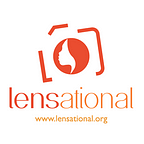Women at the forefront of photography: re-defining a male-dominated industry
By Sherry Wang — edited by Lucile Stengel
“Photography is typically a male-dominated industry. Why do you think that is?”
This was the question I had to prepare prior to representing Lensational at New York-based photography festival Photoville, in a panel discussion titled “Women at the Forefront: A Push for an Even Playing Field.”
Priori to joining the event, I set out to investigate the nature of gender misrepresentation in the industry a little further. I visited the 2017 World Press Photo Exhibit in Montreal, Canada, and out of curiosity, walked around the show to count how many of the photographers on display were women.
46 photographers were on show at the 2017 World Press Photo Exhibit. Out of 46, only 5 were women.
I wasn’t naturally gutted, but not surprised at all by the small proportion of women in the show. In 2017, a breakdown of 5 out of 46 is pretty much the norm in the industry. Despite an overwhelming number of women photographers in the sector, only a small proportion receive regular commissions or see their work featured in high-level exhibitions.
I began wondering why that is. Where did the photography industry go so wrong? Could it be due to a lack in exposure to the profession, a lack of professional development support, or simply to lower educational attainment?
The Photoville panel discussion I took part in set out to discuss this intricate and multidimensional issue.
It was very encouraging to see so many women now at the forefront of projects addressing gender disparity in the industry — it seems as though in the past years, initiatives have boomed, and voices have become louder. Yet, the discussion also highlighted how many layers there are to photography’s gender problem — from the question of how photography has historically represented women, to that of who has — and still does — the representation.
“It was very encouraging to see so many women now at the forefront of projects addressing gender disparity in the industry — it seems as though in the past years, initiatives have boomed, and voices have become louder.”
Amanda Gorence, photo editor at Refinery29, illustrated an encouraging example of Refinery 29’s latest photo project, Take Back the Beach, which encourages women to share photographs of their own body images. The project highlighted the importance of shifting mainstream imagery of women’s bodies, and often unilateral standards of beauty. We also heard from Daniella Zalcman, the founder ofWomenPhotograph, an innovative platform and the first of its kind to be dedicated to showcasing female photographers’s work and and promoting them to commissioners.
I was proud to share more about Lensational’s programmes, which tie in directly with both issues, but perhaps even more with the crucial problem of who is behind the mainstream camera. In 2017, most photographs shown in the media are still produced by photographers from the developed world, who are most likely to be white men. Having worked with over 600 women across 16 marginalised communities in the developing world, Lensational sets out to help women we don’t usually see or hear about to share their own stories through their own lenses.
Our discussion didn’t neglect examples of female photographers being discriminated against at work, omitted in the media sphere, or being abused at the sole price of gender — so many aspects we still need to work harder toward. At the end of the Q&A, one photographer asked, “As a man, how can I do my part to help in this? Do I give up my job for a female photographer because she’s female?”
A panelist provided a response we can all take away: “I can’t tell you what to do about the job, but I know that you can stand up for moments when you know something isn’t right.”
It’s everyone’s job to not turn a blind eye to these issues, and it’s okay — and necessary — to speak up. The discussion was insightful, grounded, and optimistic. I’m excited for what’s to come as we all continue to wake up a little more.
Purchase female-centric photographs with a purpose at photos.lensational.org.
